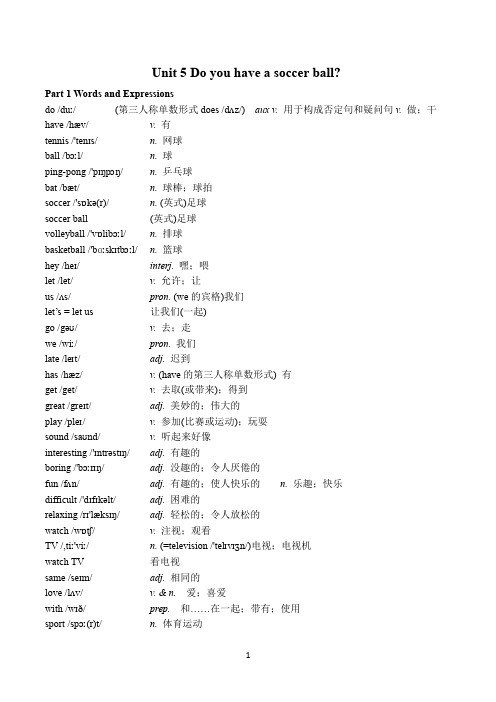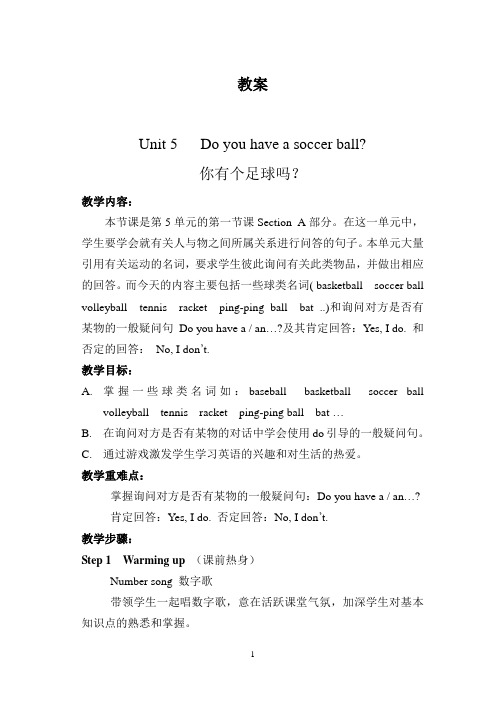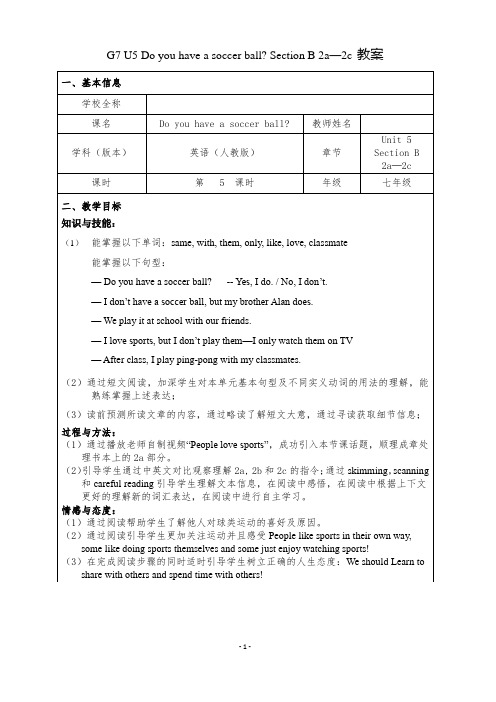Unit 5 Do you have a soccer ball 2
Unit5.2 Do you have a soccer ball?(Section B)-七年级英语人教版(上册)(解析版)

Unit 5 Do you have a soccer ball?课时2 Section B(满分: 100分时间: 40分钟)一、根据句意及汉语提示填写单词。
(共5小题,每小题2分,共计10分)1. —Let’s play soccer.—No. That sounds ________ (无聊的).2. English is ________ (难的) for me.3. Dad, can I ________ (观看) TV now?4. I think playing basketball is ________ (有趣的).5. Let’s play tennis. It’s ________ (轻松的).【答案】1. boring2. difficult3. watch4. interesting/fun5. relaxing二、连词成句。
(共5小题,每小题2分,共计10分)1. a, I, tennis, have, ball, don’t__________________________________________.2. Bill, a, does, ping-pong, have, bat_________________________________________?3. go, basketball, let’s, to, the, watch, game__________________________________________.4. so, for, volleyball, boring, is, me__________________________________________.5. soccer, bed, Bob’s, the, under, is, ball__________________________________________.【答案】1. I don’t have a tennis ball2. Does Bill have a ping-pong bat3. Let’s go to watch the basketball game4. V olleyball is so boring for me5. Is Bob’s soccer ball under the bed三、根据汉语意思完成句子,每空一词。
Unit5 Do you have a soccer ball教案

Unit 5 do you have a soccer ball ?单元目标与要求1、能够学会用have 对物品的所属进行提问与回答, 如:Do you have a soccer ball? Yes , I do 。
/ No, I don’t 。
Does he have a tennis racket ? Yes, he does. / No , he doesn’t 。
2、能够学会用L et’s …提建议.如L et’s play ping -pong 。
3、能够运用所学词汇来谈论自己喜欢的球类运动、不 喜欢的球类运动及其原因。
4、能够谈论怎样和自己的朋友度过一段愉快的时光。
5、能够听、说读写本单元重点单词。
6、能够掌握have 在一般现在时中的运用,特别注意当 主语为第三人称单数时的用法,以及Let’s 开头的祈使句,一 些形容词的用法。
A 第一课时(附课件)○○教学内容1a Match the words with the things in the picture. 1b Listen and circle the words you hear. 1c Pairwork ○○教学目标a. 能够听、说、写单词:have soccer ball tennis racket ping —pong volleyball basketball batb. 能够听、说、认读句子:Do you have …?Yes , I do 。
/ No , I don’t. 并能在实际情景中运用。
c 。
能够完成1a 、1b 中的任务 ○○教学重难点1、重点:能听说读写单词:have soccer ball tennis racket ping-pong volleyball basketball bat 句子:Do you have …? Yes, I do. / No , I don't.2、难点:有关球类词汇的发音,以及助动词do 的运用. ○○课前准备1、学生常见的球类运动器材或有关的教学幻灯片或图片。
河北省保定市安国市实验中学人教版七年级英语上册课件Unit5DoyouhaveasoccerballSectionA(二)

如: - Do you have a basketball? 你有篮球吗? - Yes, I do. / No, I don’t. 是的,有。/ 不,没有。 - Does he have a tennis racket? 他有一个网球拍吗? - Yes, he does. / No, he doesn’t. 是的,他有。/ 不,他没有。
一般疑问句
变一般疑问句时,也需要借助助动词do 及其第三人称单数形式does。 主语为非第三人称单数时,句型为: Do+主语+have...? 主语为第三人称单数时,句型为: Does+主语+have...? 肯定回答: Yes, 主语+do / does. 否定回答: No, 主语+don’t / doesn’t.
have / has的用法
肯定句 谓语动词have在句中有两种形式,即have 和has。 have用于第一人称 (I, we), 第二人称 (you), 以及第三人称复数 (they或其他复数名词 等) 后; has用于第三人称单数(he,she,it或单数 名词)后。
如: I have a baseball. 我有一个棒球。 They have some interesting books. 他们有一些有趣的书。 Tom has a Chinese friend. 汤姆有一位中国朋友。 The school has three grades. 这所学校有三个年级。
a tennis ball.
have a basketball but I don’t have I________________, ___________ a soccer ball ______________.
Unit5 Do you have a soccer ball教学设计

Unit5 Do you have a soccer ball?Section B 2 (2a-2c)一、教学目标:1. 掌握下列词汇: watch TV, student, sport, play sports, to, same, love, with, them, only, like, easy, after, class, classmate2. 阅读有关体育用品收藏的小短文,并能获得相关信息。
3. 通过阅读有关运动的文章和对话, 使学生更加热爱体育活动并培养一种适合自己的体育爱好。
二、教学重难点1. 教学重点:引导学生进行阅读训练,来掌握行为动词一般现在时的肯定句、否定句的结构,尤其是单三形式的变化。
2. 教学难点:行为动词一般现在时的肯定句、否定句的结构,尤其是单三形式的变化。
三、教学过程Ⅰ. RevisionMake conversations.play computer games interestingplay volleyball boringwatch TV relaxingplay basketball difficultfunⅡ. BrainstormTry to list as many ball games as you can.Ⅲ. Writing1. Find the sports words in the unit. Write them in the correct column.2. Make a report to your partner first.S1: I have a soccer ball, a volleyball, two tennis balls, three ping-pong bat…I don't have a basketball, a tennis bat, a baseball bat…3. Exchange the chart with your partner. Report yourpartner's sports collection.S2: He has a soccer ball, a volleyball, two tennis balls, three ping-pong bat…He doesn't have a basketball, a tennis bat, abaseball bat…Ⅳ. Reading1. Our school magazine made a survey about sports collection. This is the survey results. Read the passageand answer the question:Do you have a soccer ball?2. Ss read the passage quickly and find the answer to the question.3. Check the answer. Let some students say their answer and say why?(指导:在读短文时,应重点抓住soccer ball,通过对比文中的信息,从而轻松地就能知道答案。
Unit 5 Do you have a soccer ball 七年级上课文原文及重点

Unit 5 Do you have a soccer ball?Part 1 Words and Expressionsdo /duː/ (第三人称单数形式does /dʌz/) aux v.用于构成否定句和疑问句v.做;干have /hæv/ v.有tennis /'tenɪs/ n. 网球ball /bɔːl/ n.球ping-pong /'pɪŋpɔŋ/ n. 乒乓球bat /bæt/ n. 球棒;球拍soccer /'sɒkə(r)/ n. (英式)足球soccer ball (英式)足球volleyball /'vɒlibɔːl/ n.排球basketball /'bɑːskɪtbɔːl/ n.篮球hey /heɪ/ interj.嘿;喂let /let/ v. 允许;让us /ʌs/ pron. (we的宾格)我们let’s = let us 让我们(一起)go /gəʊ/ v.去;走we /wiː/ pron.我们late /leɪt/ adj. 迟到has /hæz/ v. (have的第三人称单数形式) 有get /get/ v.去取(或带来);得到great /greɪt/ adj.美妙的;伟大的play /pleɪ/ v. 参加(比赛或运动);玩耍sound /saʊnd/ v.听起来好像interesting /'ɪntrəstɪŋ/ adj.有趣的boring /'bɔːrɪŋ/adj.没趣的;令人厌倦的fun /fʌn/ adj.有趣的;使人快乐的n.乐趣;快乐difficult /'dɪfɪkəlt/ adj. 困难的relaxing /rɪ'læksɪŋ/ adj.轻松的;令人放松的watch /wɒtʃ/ v.注视;观看TV /,tiː'viː/ n. (=television /'telɪvɪʒn/)电视;电视机watch TV看电视same /seɪm/ adj. 相同的love /lʌv/ v. & n. 爱;喜爱with /wɪð/ prep.和……在一起;带有;使用sport /spɔː(r)t/ n. 体育运动them /ðəm/ pron. (they的宾格) 他(她、它)们only /'əʊnli/ adv.只;仅like /laɪk/ v. 喜欢;喜爱easy /'iːzi/ adj.容易的;不费力的after /'ɑːftə(r)/prep. & conj.在……之后class /klɑːs/ n.班级;课classmate /'klɑːsmeɪt/ n.同班同学Bill /bɪl/比尔(男名)Part 2:Texts课文(一)Cindy:Hey, Helen, let’s go! We’re late!Helen: OK.Cindy: Do you have the baseball?Helen: Yes, I do. It’s in my bag.Cindy: And where’s our baseball bat?Helen: Bill has it.Cindy: Oh, yeah. And do you have your jacket?Helen: Oh, no, I don’t. It’s on the chair. Let me get it. Cindy: And your hat, too!Helen: OK, I have my jacket and hat. Let’s go!Structure1. Do you have a baseball?Yes, I do./No, I don’t. I have a volleyball.2. Do you have a ping-pong bat?Yes, I do./No, I don’t. I have a ping-pong ball.3. Does she have a tennis ball?Yes, she does./No, she doesn’t. She has a baseball.4. Does he have a soccer ball?Yes, he does./No. he doesn’t. He has two ping-pong bats. 5. Do they have a basketball?句型:—Do/Does sb. have…?—Yes, sb. do / does.—No, sb. don’t / doesn’t.Write each word in the correct place in the chart.将方框中的单词填入表格中正确的位置。
邓州市某中学七年级英语上册Unit5Doyouhaveasoccerball课件2新版人教新目标版

小练习 : 根据汉语意思填空 太好了 ! 我终于可以回家了 _G_r_e_a_t ! I can finally go home.
Expressions
Do you have the basketball?你有篮球吗 ? 【用法]当表示某人有某物时我们可以用have来表示所属关系。 【辨析]have/has与there be 〔1〕have/has表示所属关系,即〞某人或某物有什么” 〔2〕there be表示存在,即〞某地有某人某物” 【小实练习例:]Does she have a soccer ball ?Yes , she does。/No , she doesn’t.
C. doesn't play
(C )2.—Let's play tennis.—Oh, that ______ good.
A. looks
B. interesting
C. sounds
(C )3.Does she often ______ basketball?
A. play
B. to play
C. plays
Exercise 汉译英
4.让我去取那个篮球。 ___L_e_t _m_e__g_e_t _th_a_t_b_a_s_k_e_tb_a_l_l.__________________________
5.露西有一个足球。 ___L__u_c_y_h_a_s_a__fo_o_t_b_a_ll_. _________________________________
Unit 5 Do you have a soccer ball教案

教案Unit 5 Do you have a soccer ball?你有个足球吗?教学内容:本节课是第5单元的第一节课Section A部分。
在这一单元中,学生要学会就有关人与物之间所属关系进行问答的句子。
本单元大量引用有关运动的名词,要求学生彼此询问有关此类物品,并做出相应的回答。
而今天的内容主要包括一些球类名词( basketball soccer ball volleyball tennis racket ping-ping ball bat ..)和询问对方是否有某物的一般疑问句Do you have a / an…?及其肯定回答:Yes, I do. 和否定的回答:No, I don’t.教学目标:A.掌握一些球类名词如:baseball basketball soccer ballvolleyball tennis racket ping-ping ball bat …B.在询问对方是否有某物的对话中学会使用do引导的一般疑问句。
C.通过游戏激发学生学习英语的兴趣和对生活的热爱。
教学重难点:掌握询问对方是否有某物的一般疑问句:Do you have a / an…?肯定回答:Yes, I do. 否定回答:No, I don’t.教学步骤:Step 1 Warming up (课前热身)Number song 数字歌带领学生一起唱数字歌,意在活跃课堂气氛,加深学生对基本知识点的熟悉和掌握。
Stet 2 Leadin(导入)通过一段小视频引入今天的话题。
Step 3 New words (新单词)1、Present the new words and read (呈现新单词并会读)通过幻灯片播放各种球类运动的图片来认识和学习这些新的名词。
(baseball棒球basketball篮球soccer ball 足球volleyball排球ping-pong ball/bat乒乓球/拍tennis网球racket拍)2、practice(练习)课文中1a 和1b部分练习。
七年级英语下册《Unit5 Do you have a soccerball》课件2 人教新目标版

B: Yes, I do. I have a …/
No, I don’t. I don’t have a …
Report: I have a …, but I don’t have
a … Jim is my friend. He has a…, but he doesn’t have a…
1a
Match the words with the things in the picture.
1. tennis ball __ a 2. ping-pong bat __ f c 3. soccer ball __ e 4. volleyball __ d 5. basketball __ 6. baseball bat __ b
Game: Who has the best eyes? 谁的眼睛最亮?
Lead in
have 有
I have a ruler.
I have a tennis ball
Make sentences with have.(用have说句子)
I don’t have a ruler.
I don’t have a volleyball.
Learning
• • • • • • • • soccer ball 英式足球 basketball 篮球 volleyball 排球 baseball 棒球 baseball bat 棒球棒 ping-pong ball 乒乓球 ping-pong bat 乒乓球拍 tennis ball 网球
But he doesn’t have a computer game. doesn’t +动词原形
Does she have a schoolbag? Yes, she does.
七年级英语上册《Unit 5 Do you have a soccer ball》知识点 (新版)人教版

Unit 5 Do you have a soccer ball?1. Do you have......? Yes, I do. No, I don’t..你有……吗?是的,我有。
不,我没有。
Do they have......? Yes, they do. No, they don’t..Does he have......? Yes, he does. No, he doesn’t.Does she have......? Yes, she does. No, she doesn’t.在一般现在时中,句子的谓语动词若是实义动词,常借助助动词do或does来构成否定句或疑问句。
Does用于主语是第三人称单数的句子中,其他情况用do。
2. do/does1)作助动词,帮助构成一般现在时的否定句或疑问句,无意义。
Do you have a soccer ball? 你有足球吗?I don’t know. 我不知道。
Does Jim have a sister? 吉姆有妹妹吗?What does he like? 他喜欢什么?He doesn’t like English. 他不喜欢英语。
2) 作实义动词,“做,干”。
I do my homework every day. 我每天都做家庭作业。
Bob does his homework every day. 鲍勃每天都做家庭作业。
3) 在一般现在时中,do/does 可用来替代上文出现过的动词,以避免重复。
Do you have a soccer ball? 你有足球吗?Yes, I do. 是的,我有。
(do 代have)Does she have an eraser? Yes, she does.I don’t have a soccer ball, but my brother Alan d oes.我没有足球,但我的哥哥艾伦有。
3.Let’s do sth. “(让)我们做某事吧。
新乡市第六中学七年级英语上册Unit5DoyouhaveasoccerballPeriod2Sect

Unit 5 Do you have a soccer ball?Period 2 Section A 2d—3c【课型】语法课学习目标1.能掌握本课重点词汇:let us,let’s,go,we,late,get,great,play2.能正确使用助动词do/does引导的一般疑问句询问某人是否有某物。
3.能正确区分have 和has的用法,并能恰当运用进行物品所属的描述。
4.初步运用“Let’s do...”提建议。
学习过程【自主学习】1.请在课前会拼读下面的单词,并熟记。
let us,let’s,go,we,late,get,great,play2.Pair work两人一组,用所学的功能句谈论拥有的任何物品。
A:Do you have a...?B:Yes,I do./No,I don’t.A:Does...have a...?B:Yes,he/she does./No,he/she doesn’t.3.Role-play the conversation in 2d.4.Answer the following questions:1)Are Cindy and Helen going to play baseball?2)Does Cindy have the baseball?3)Do they have the baseball bat?4)Who has the baseball bat?[新知呈现]1.小组观察下面的句子,讨论两者的不同。
I have a volleyball.You have a ping-pong ball.She has a baseball.He has two ping-pong bats.They have a volleyball.观察与思考1:在肯定句中,当句子中的主语是第人称数时,谓语动词用has;其余人称时(包括第一人称单复数,第人称单复数,第人称复数),谓语动词用have。
人教版七年级上册英语讲义 Unit 5 Do you have a soccer ball

Unit5 Do you have a soccer ball?讲义一、【重点单词】do /du:/助动词,帮助构成一般现在时的否定句或疑问句,无意义;实义动词“做,干”have /hæv/有tennis /'tenɪs/网球ball /bɔ:l/球ping-pong乒乓球bat /bæt/球棒;球拍soccer /'sɑ:kər/,/'sɒkə/(英式)足球soccer ball(英式)足球volleyball /'vɒlɪbɔ:l/排球basketball /'bɑ:skɪtbɔ:l/篮球let /let/允许;让us /ʌs/ (we的宾格)我们let's = let us让我们(一起)go /ɡəʊ/去;走we /wi:/我们late /leɪt/迟到has /hæz/有(have的第三人称单数形式)get /ɡet/去取(或带来);得到great /ɡreɪt/美妙的;伟大的play /pleɪ/参加(比赛或运动);玩耍sound /saʊnd/听起来好像interesting /'ɪntrəstɪŋ/有趣的;使人快乐的;乐趣;快乐difficult /'dɪfɪkəlt/困难的relaxing /rɪ'læksɪŋ/轻松的;令人放松的watch /wɒʧ/注视;观看TV /,ti:'vi:/电视same /seɪm/相同的love /lʌv/爱;喜爱with /wɪð/和...在一起;带有;使用sport /spɔ:(r)t/体育运动them /ðem/ /ðəm/他(她、它)们only /'əʊnlɪ/只;仅like /laɪk/喜欢;喜爱easy /'i:zi/容易的;不费力的after /'ɑ:ftə/在...之后class /klɑ:s/班级;课classmate /'klɑ:smeɪt/同班同学二、【重点短语】1. have a volleyball 有一个排球2. play volleyball/tennis 打排球/网球3. have a ping-pong/table tennis 有一个乒乓球4. play ping-pong/table tennis 打乒乓球5. with our friends 和我们的朋友一起6. have a football/soccer ball 有一个足球7. play football/soccer 踢足球8. at school 在校,在上学9. play sports 做运动10. play computer games 玩电脑游戏11. watch TV 看电视12. in the same school 在同一所学校13. after class 下课后14. go to school 去上学三、【重点句型】1. —Do you have a ping-pong bat? 你有一个乒乓球拍吗?—No, I don’t. 不,我没有。
七年级英语上册Unit5Doyouhaveasoccerball教案人教版

Unit 5 Do you have a soccer ball?The First PeriodSection A (1a-2d)Ⅰ.Teaching aims:1.Knowledge aims:(1)Keywords:do,have,tennis,ball,soccer,volleyball,basketball,let,us,go,we,late,has,ge t(2)Key phrases:soccer ball,let’s go,be late(3)Important sentences:A:Do you have a ping-pong bat?B:Yes,I do.A:Do you have a ping-pong ball?B:No,I don’t.2.Ability aims:Talk about different kinds of balls.3.Emotion aims:Make students fall in love with ball sports.II.Important points:Train students’ listening and speaking skills.III.Difficult points:Ask and answer questions using “do” or “does”.IV.Teaching processStep 1 Warming up1.Show a volleyball to the class.T:What’s this in English?Ss:It’s a volleyball.T:Yes,you are right.How do you spell it?Ss:V-O-L-L-E-Y-B-A-L-L,volleyball.Show students other objects,such as basketball,tennis ball,soccerball ,baseball,ping-pongbat...Teach students new words in the same way.2.Work on 1a.①Please look at the picture in 1a.There are some balls in it.Do you know what kindof balls theyare?Match the words with the things in the picture.②Teacher checks the answers.③Look at the key structure.—Do you have a ping-pong bat?—Yes,I do.—Do you have a ping-pong ball?—No,I don’t.Read the words and dialogue after the teacher and then read it together.Step 2 ListeningWork on 1b,2a,2b.1.Play the recording for the first time.Students only listen.2.Play the recording again and ask students to do 1b,2a,2b.3.Check the answers in 1b,2a,2b.Step 3 PairworkWork on 1c.Practice the conversation with your partner. Then ask and answer questions about the things in 1a.A: Do you have a ping-pong bat?B: Yes,I do.A: Do you have a ping-pong ball?B: No,I don’t.Work on 2c.Ask and answer questions about the people in 2a.A:Does Jane have a tennis ball?B:No,she doesn’t.Ask some pairs to act out their conversation.Step 4 Role-playWork on 2d.Let students read the conversation after the teacher,and then practice the conversation with theirpartners.Teacher asks some pairs to act out the conversation in front of the class.Language points1.have的用法(1)have为实义动词,意为“有”,常用句型为sb. have/has +sth.,表示“某人有某物”,当主语为第三人称单数时,have用其单三形式has。
人教版七年级英语上册unit 5 Do you have a soccer ballSection

Do you have a/an …? Yes, I do. /No, I don’t. Where is it? It is…
3a Write each word in the correct place in the chart.
七年级上
Unit 5 Do you have a soccer ball?
Section A Period Two
Words review
great adj. 美妙的;伟大的 play v. 玩;打(球) sound v. 听起来 interesting adj. 有趣的
Lead-in 1
Let’s chant!!
pprinagc-tipcoentghbeacllo, ntovoe.rsations with A:yHomurmp…alrettn'sear.sk.
A: __D__o__ your friends have a
basketball?
B: Yes, they ___d_o__. They have two basketballs
Do you have a soccer ball? Do you have a soccer ball? Yes, I do. Yes I do. Do you have a volleyball? Do you have a volleyball? No, I don’t. No, I don’t.
Lead-in 2
Do you know where the 2014 FIFA World Cup was held?
人教版新目标版七年级英语上册 Unit 5 Do you have a soccer ball?第2课时 Section A2a—2d教案

录音机、磁带、课本,教学案
知识
链接
法
情境教学和合作学习法。
教学过程
Step 1 Warming up and lead-in
T:Do you have a pen ?
S1: Yes, I do
T: Do you have a baseball?
S1:Do you have a cup?
S2:Yes,I do
S1:Do you have a soccer ball?
S2:No, I do
3.After doing this, devide the class into two groups, Make conversations in groups
S1:No ,I dont’
T:How many sports things do you know?
Ss:Basketball,baseball/…
2. In this procedure, students will learn how to talk about ownership
Ask two students to work in pairs like this
T:Look at the pictures in 2b and name them. What are these?
(Point at the baseball, basketball,volleyball,football.)
Ss:They are…
T:There are four children in the conversations. Who are they? Please listen and find the answer.
Unit 5 Do you have a soccer ball_教案

41’09’’---
41’22’’
Help the Ss set a correct attitude.
Sports make us healthy! Playing sports with friends make us happy!
Ss conclude and try to feel and getthecorrect moral attitude.
利用电子白板清晰标注标题问句及每段第一句话中的关键词,帮助学生迅速得出答案。用图片表达猜测与事实不符合的惊讶,引起学生好奇。利用电子白板圈出三个孩子不只是回答了标题的问句,还各自有阐述。为后文做铺垫
2b
While-reading (Scanning)
12’04’’--
19’19’’
Guide the Ss to understand the reading passage well.
A: Do you have a …?
B: Yes, I do. I have a…/No, I don’t . I don’t have a…
Ask and answer.
利用电子白板展示很多学生学习过的球类名词图片,激发学生的学习兴趣,使教学环境更加真实生动。
Free talk
2’56’’---
利用电子白板对比标注指令中的中英文,学生能很快理解老师的指令,帮助其消除学习新课的紧张。
Situation Presentation
6’18’’---
6’34’’
To set a big situation for the whole lessonand lead in 2b, the reading material naturally.
七年级英语上册unit5-Do-you-have-a-soccer-ball教学设计

Unit5 Do you have a soccer ball?(SectionB2a~2c)Ⅰ.教学整体设计思路本课主要采用任务型教学模式,利用多媒体(PPT)以及畅言系统中的电子白板设计一些阅读任务,通过略读、细读、跳读等阅读策略快速获取信息,从而达到读懂叙述运动和体育用品的短文。
Ⅱ.教学背景分析教材分析本课是一节阅读课。
活动2a~2c的内容是一个整体:2a 巩固词汇,为下一步的阅读做好铺垫,要求学生根据自己所拥有的体育用品的情况,将单元中出现的有关词汇进行分类巩固句型I have…。
2b~2c要求学生阅读校刊上一则有关体育用品调查报告,并完成不同的阅读任务。
这要求学生能够根据图意预测文章大意,通过谈论球类运动,让孩子们体会与朋友共度快乐时光的愉悦心情.在教学过程中,注意对学生阅读技巧和语篇分析能力的培养。
学情分析在本课阅读前,学生通过对SectionA和SectionB的部分学习,对表达自己拥有体育用品情况的词汇和句型已经比较熟悉。
因此学生在朗读短文前,会比较容易预测篇章的大意,为学生理解文章奠定基础。
文章中有个别新词汇或语言结构,会造成学生理解上的障碍。
另外,本课也出现了许多名词复数,在口头训练时要提醒学生注意词尾加s。
在读前设计适当的任务,为阅读理解扫除障碍。
本课2c的设计也是为巩固第三人称单数时的陈述句要注意动词变成三单形式,对学生来说,也是很大难点。
但该部分学习内容很容易引起学生们的共鸣,极易引起学生表达的欲望。
Ⅲ.教学目标分析nguage goals:(1)Key words and phrases:正确理解和使用词汇:same, but, with, sports, them, only, like, easy, after , classmates , 并了解词组go to the same school, with our friends, watch… on TV, after class, play ping-pong的意义.(2)Key sentences:I don’t have a soccer ball, but my brother Alan does.I have two soccer balls, three volleyballs, four basketballs and five baseballs and bats.2.Ability goals:通过略读、细读、跳读等阅读策略快速获取信息,完成相关的阅读任务,能够读懂叙述运动和体育用品的短文。
Unit_5__Do_you_have_a_soccer_ball

燕郊中学七年级英语导学案课型:新课编写:米娜审核:七年级全体英语教师领导签字 1 学生班级:姓名:时间: 2011年月日Unit 5 Do you have a soccer ball? Section A【学习目标】1.熟记以下单词:have ,soccer, ball ,tennis ,racket, ping-pong, volleyball, basketball, bat, does, doesn’t2.掌握重点句型:—Do you have a soccer ball? —Yes, I do./ No, I don’t. —Does he/she have a tennis racket ?—Yes, he/she does./ No, he/she doesn’t.—Do they have a basketball?—Yes,they do./No, they don’t.3.○1动词have的一般现在时的用法. ○2使用do和does引导的一般疑问句的构成和使用.【学习导航】一、预习感知:写出球类名词的英文名称并翻译下列动词短语篮球__________ 棒球___________ 排球__________ 足球__________ 乒乓球________网球__________打乒乓球________________ 打篮球________________ 踢足球_________________打棒球___________________打网球_____________________打排球__________________ 参加运动________________二、合作探究1.do的用法①作助动词无意义,翻译下列句子并能用have造出相似的句子.Do you have a basketball? Yes, I do.Do they have a soccer ball? No, they don’t.Does she have a computer? No, she doesn’tDoes he have a ping-pong ball? Yes,he does./No,he doesn’t.句中的do和does都是构成疑问句和否定句的助动词do not的缩写形式_______________ does not的缩写形式_______________don’t/doesn’t+动词原形. 如,I don’t ___________(have) a soccerball. (我没有足球)He doesn’t ___________(have) a ping-pong ball.(他没有乒乓球)②作实义动词,意为________,它的第三人称单数形式是________ . 如,I do my homeworkevery day.(我每天做作业) 改为否定句:I ________do my homework every day.2. Let’s play volleyball①let’s=let us, let+人称代词的宾格,us是_________的宾格②let’s +动词原形,如,Let’s ____________(play) soccer.3. manymany+复数名词, 如,We have many sports ___________(club).4. class①作名词,意思是_________,如,I am in Class 6 .(我在6班).②作名词,意思是_________,如,I have 7 classes every day.(我每天上7节课)5.have为实义动词,意为‚有‛,has为have的第三人称单数形式,在一般现在时中,当主语是第三人称单数时,要用has,其他的用原形have。
- 1、下载文档前请自行甄别文档内容的完整性,平台不提供额外的编辑、内容补充、找答案等附加服务。
- 2、"仅部分预览"的文档,不可在线预览部分如存在完整性等问题,可反馈申请退款(可完整预览的文档不适用该条件!)。
- 3、如文档侵犯您的权益,请联系客服反馈,我们会尽快为您处理(人工客服工作时间:9:00-18:30)。
Unit 5 Do you have a soccer ball?
课型;新授课时;授课时间
Section B 1a-2c第3课时
【学习目标】:1.掌握单词interesting,boring,fun,difficult,relaxing,watch,watch TV
2.熟练掌握提建议的句型Let's--
【情感目标】
利用学生喜爱运动的心理,激发学生学习英语的欲望和兴趣,使他们乐于参与各种英语实践活动。
在小组活动中,培养学生团结协作精神。
【学习重点】:1.学会使用描述性形容词对事物做出评价如:interesting/
boring/difficult/relaxing/TV等
2.熟练掌握Let's--句型
【教学用具】: media ,pictures and photos
【教法和学法】听说
【学习过程】:
一、自主学习(教师寄语:Many hands make light work. )
学习任务一: 熟练掌握本课的7个单词
1.个人自读,记忆本课单词.
2.小组互相检查单词读写情况.
3.根据汉语写出下列英语单词并展示.
有趣的,令人感兴趣的______________/__________ 无聊的,令人生厌的__________ 困难的______________ 轻松的______________ 看电视_________________
4.小组合作完成1a,从而做1b的活动.
学习任务二:听录音,练习Let's--的用法
1.听录音完成2a.
2.再听一遍,完成2b内容.
二、合作共建(教师寄语:Many hands make light work. )
小组讨论play basketball能否play the basketball
三、系统总结(教师寄语:No man can do two things at once.)
小组讨论总结sound 为什么词?后需加什么样的词?举例说明.
四、【诊断评价】(教师寄语:Never do things by halves)
(一)根据句意及首字母提示补全单词
1. These questions are very d_____________.
2. They play football e__________ day.
3. D________ she like sports?
4. That s__________ interesting.
5. I don't w____________ TV in the evening.
6.—Let's play tennis.—No, it's b______________.
7. We have many c________:volleyball,basketball,ping-pong and more.
(二)翻译短语
1.打排球____________________
2.玩电子游戏_________________
3.看电视___________________
4.足球踢_____________________
5.做运动___________________
6.听起来很有趣________________
7.体育俱乐部_______________ 8.那么难______________________
(三)选择
1.—Do Lucy and Lily have a baseball? —Yes,____________.
A. she does
B. she has
C. they do
D. they have
2.—Let's play basketball. —No,_____________.
A. it's boring
B. it's interesting
C. it's good
D. it's fun
3.That's an ___________ question.
A. interesting
B. boring
C. difficult
D. relaxing
4. Do you play _______?
A. basketballs
B. a basketball
C. basketball
D. the basketball
5. Let's _____________.
A. play ping-pong
B.t o play ping-pong
C. playing ping-pong
D. play the ping-pong
6. I _________ have a watch..
A .am not B. dont C.don't D.doesn't Homework
板书设计:
五、【课后反思】(教师寄语:Never do things by halves)。
